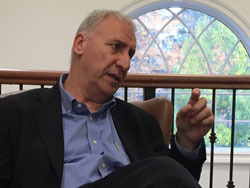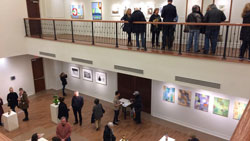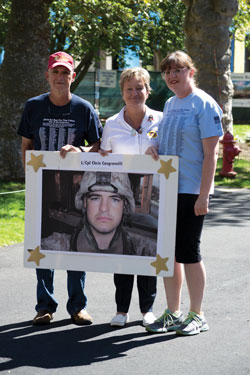The Visiting Writers Series hosted their second event of the semester with writer Edward Hirsch as guest on Nov. 17.
Hirsch is the recipient of the National Book Critics Circle Award, a National Endowment for the Arts Fellowship, and the American Academy of Arts and Letters Award for Literature. He currently serves as president of the John Simon Guggenheim Memorial Foundation.
Associate Dean and Director of the Visiting Writers Series, Michael Thomas, opened the event with words from the Shakespeare play, The Tempest. He quoted the character Miranda from the play: “O, I have suffered/ with those I saw suffer.” This was a prelude to the introduction of a genre of grief and sadness, which is a genre of one of Hirsch’s most popular books of poetry.
This poetry book is titled, Gabriel: A Poem, after Hirsch’s 22-year-old son, Gabriel, who died of cardiac arrest after taking a club drug at a party. Hirsch has experienced extreme grief, but he chose to channel that grief into a book of poetry that is about his lost son.
Hirsch read from 12 selections of his work. Most memorable would arguably be “To Poetry,” “Cotton Candy,” “Branch Library,” “Special Orders,” and, of course, selections from Gabriel. When asked of his method of choosing which works he would read from, Hirsch responded, “It is written through four generations.” Hirsch says it is like a “spiritual journey.”
It starts with his grandfather in the poem “Cotton Candy,” which is about his last memory as a child with his grandfather. In this poem, Hirsch writes how he and his grandfather were walking across a bridge and how the sturdy cables of the bridge reminded him of his grandfather’s fingers. All the while, Hirsch, just a young boy at the time, was eating cotton candy.
His next poem is reminiscent of his father; it is called “Special Orders.” His father was a box salesman and, as a box salesman, a special order was a favorite of his. These were his favorite because they were more challenging and fun to create and design.
Poems about himself and his self-discovery were also presented. His poem “Branch Library” was about finding himself again. In the library he would be able to lose himself in a world of poetry and prose, but he returns to the idea of this library when he loses his thought.
Lastly, Hirsch recited from his book of poetry, Gabriel. Gabriel is a book length poem with no punctuation. The lack of punctuation, Hirsch says, “is meant to drive you forward” when reading. Throughout the book, Hirsch discusses reflections from past poets, like Ben Jonson, who have lost children and written about it.
The book is loosely divided into sections, or what Hirsch calls “near poems.” Hirsch read a handful of these “near poems” that attempted to catch the essence of the book itself. It seemed as though Gabriel was a young man who had an overall zest for life and, as Hirsch put it, “he never knew where he was going until he got there.”
The event ended with a “Question and Answer” in which many participants did not ask questions, but thanked him for his beautiful works. Gabriel earned a lot of attention in the Question and Answer portion. One question referred to the writing process of Gabriel and how it affected Hirsch. To this Hirsch said, “Writing Gabriel was tremendously helpful for me.”
He further said, “poetry can’t give us back the people we lost,” but it can help in the grieving process. The use of poetry as an outlet was important to Hirsch and was something that most of the audience members could relate to.
Being relatable is something that Michael Thomas, Associate Dean of the School of Humanities and Social Science, strives to achieve in the Visiting Writers Series. “I want a 20 year old to be enriched and enlivened by our Series as much as the 70 year old in the audience or the faculty members or scholars of poetry,” said Thomas.
Thomas said that Ed Hirsch was chosen to be a part of this year’s Visiting Writers Series because “Ed Hirsh is one of the leading American poets in the country writing today and he is also one of our best teachers of poetry.”
Furthermore, Dean Thomas says that Hirsch is a “Citizen of poetry” and that he is “the ideal person to have as one of our guests in the Visiting Writers Series.”
Of the event’s success, Thomas said, “I think it was one of the most successful events [of the Visiting Writers Series] because it reached so many people.” The response was very positive from faculty and students alike.
Samantha Genise, senior English and education student, said of the event, “The topic of this event was heavy, but it was a topic that everyone could relate to. It was very touching.”
Faculty tended to feel the same way as the students. Lecturer Professor of English Frank Fury said, “My experience was marked by the accessibility of his words, and I mean that term in the most complimentary way possible.”
“He managed to be both profound and human at the same time, and I would think that is a difficult task for any writer to pull off. He did it beautifully and movingly; I thoroughly enjoyed his reading,” he continued.
Photo courtesy of Michael Thomas




